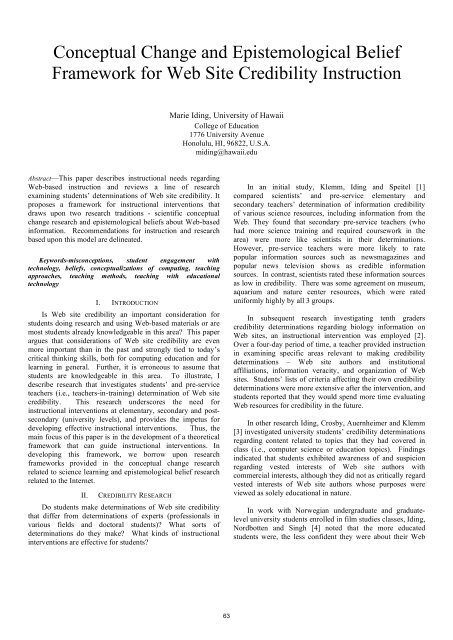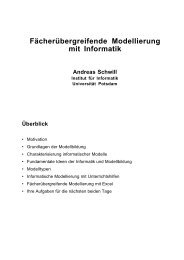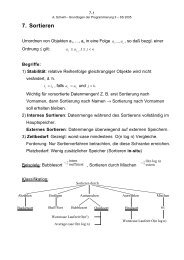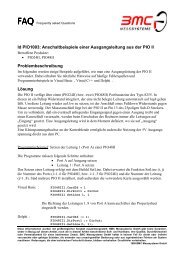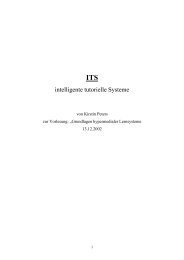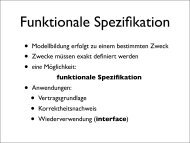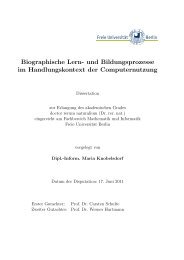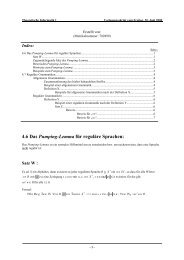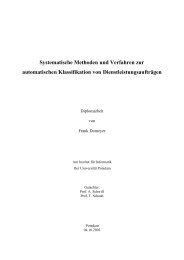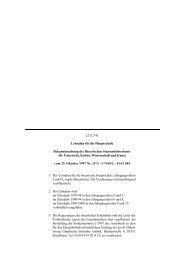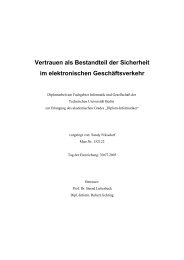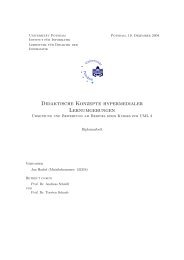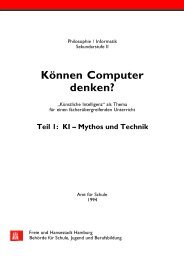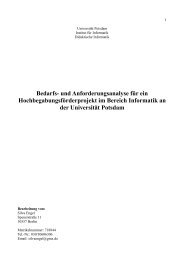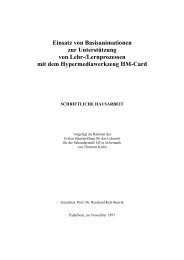Maria Knobelsdorf, University of Dortmund, Germany - Didaktik der ...
Maria Knobelsdorf, University of Dortmund, Germany - Didaktik der ...
Maria Knobelsdorf, University of Dortmund, Germany - Didaktik der ...
You also want an ePaper? Increase the reach of your titles
YUMPU automatically turns print PDFs into web optimized ePapers that Google loves.
Conceptual Change and Epistemological Belief<br />
Framework for Web Site Credibility Instruction<br />
Abstract—This paper describes instructional needs regarding<br />
Web-based instruction and reviews a line <strong>of</strong> research<br />
examining students’ determinations <strong>of</strong> Web site credibility. It<br />
proposes a framework for instructional interventions that<br />
draws upon two research traditions - scientific conceptual<br />
change research and epistemological beliefs about Web-based<br />
information. Recommendations for instruction and research<br />
based upon this model are delineated.<br />
Keywords-misconceptions, student engagement with<br />
technology, beliefs, conceptualizations <strong>of</strong> computing, teaching<br />
approaches, teaching methods, teaching with educational<br />
technology<br />
I. INTRODUCTION<br />
Is Web site credibility an important consi<strong>der</strong>ation for<br />
students doing research and using Web-based materials or are<br />
most students already knowledgeable in this area? This paper<br />
argues that consi<strong>der</strong>ations <strong>of</strong> Web site credibility are even<br />
more important than in the past and strongly tied to today’s<br />
critical thinking skills, both for computing education and for<br />
learning in general. Further, it is erroneous to assume that<br />
students are knowledgeable in this area. To illustrate, I<br />
describe research that investigates students’ and pre-service<br />
teachers (i.e., teachers-in-training) determination <strong>of</strong> Web site<br />
credibility. This research un<strong>der</strong>scores the need for<br />
instructional interventions at elementary, secondary and postsecondary<br />
(university levels), and provides the impetus for<br />
developing effective instructional interventions. Thus, the<br />
main focus <strong>of</strong> this paper is in the development <strong>of</strong> a theoretical<br />
framework that can guide instructional interventions. In<br />
developing this framework, we borrow upon research<br />
frameworks provided in the conceptual change research<br />
related to science learning and epistemological belief research<br />
related to the Internet.<br />
II. CREDIBILITY RESEARCH<br />
Do students make determinations <strong>of</strong> Web site credibility<br />
that differ from determinations <strong>of</strong> experts (pr<strong>of</strong>essionals in<br />
various fields and doctoral students)? What sorts <strong>of</strong><br />
determinations do they make? What kinds <strong>of</strong> instructional<br />
interventions are effective for students?<br />
Marie Iding, <strong>University</strong> <strong>of</strong> Hawaii<br />
College <strong>of</strong> Education<br />
1776 <strong>University</strong> Avenue<br />
Honolulu, HI, 96822, U.S.A.<br />
miding@hawaii.edu<br />
63<br />
In an initial study, Klemm, Iding and Speitel [1]<br />
compared scientists’ and pre-service elementary and<br />
secondary teachers’ determination <strong>of</strong> information credibility<br />
<strong>of</strong> various science resources, including information from the<br />
Web. They found that secondary pre-service teachers (who<br />
had more science training and required coursework in the<br />
area) were more like scientists in their determinations.<br />
However, pre-service teachers were more likely to rate<br />
popular information sources such as newsmagazines and<br />
popular news television shows as credible information<br />
sources. In contrast, scientists rated these information sources<br />
as low in credibility. There was some agreement on museum,<br />
aquarium and nature center resources, which were rated<br />
uniformly highly by all 3 groups.<br />
In subsequent research investigating tenth gra<strong>der</strong>s<br />
credibility determinations regarding biology information on<br />
Web sites, an instructional intervention was employed [2].<br />
Over a four-day period <strong>of</strong> time, a teacher provided instruction<br />
in examining specific areas relevant to making credibility<br />
determinations – Web site authors and institutional<br />
affiliations, information veracity, and organization <strong>of</strong> Web<br />
sites. Students’ lists <strong>of</strong> criteria affecting their own credibility<br />
determinations were more extensive after the intervention, and<br />
students reported that they would spend more time evaluating<br />
Web resources for credibility in the future.<br />
In other research Iding, Crosby, Auernheimer and Klemm<br />
[3] investigated university students’ credibility determinations<br />
regarding content related to topics that they had covered in<br />
class (i.e., computer science or education topics). Findings<br />
indicated that students exhibited awareness <strong>of</strong> and suspicion<br />
regarding vested interests <strong>of</strong> Web site authors with<br />
commercial interests, although they did not as critically regard<br />
vested interests <strong>of</strong> Web site authors whose purposes were<br />
viewed as solely educational in nature.<br />
In work with Norwegian un<strong>der</strong>graduate and graduatelevel<br />
university students enrolled in film studies classes, Iding,<br />
Nordbotten and Singh [4] noted that the more educated<br />
students were, the less confident they were about their Web


